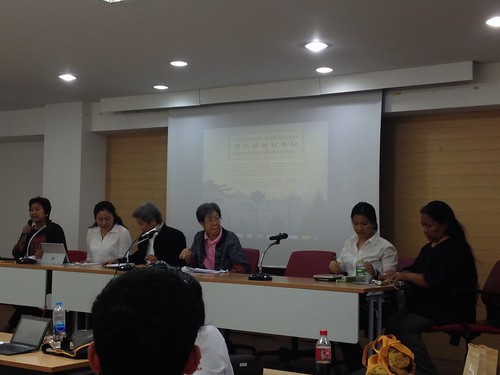Despites laws on community rights under previous constitutions, academics and activists pointed out that rights over resources for local communities have been put under severe strain from the authoritarian regime of the Thai junta.
Academics and human rights activists gathered at Thammasat University, Tha Prachan Campus in Bangkok, on Monday, 9 May 2016, at a public forum titled ‘Judicial Process, Community Rights and Human Defenders’ to discuss community rights under the military regime in Thailand.
At the discussion, Bencharat Sae-chua, a lecturer from the Institute of Human Rights and Peace Studies of Mahidol University, said that the current political situation in Thailand puts heavy strain on community rights and the rights to resources as people’s political rights are suspended.
She pointed out that the greatest legal challenge of human rights defenders or community rights activists currently is not litigation filed against them or the process referred to technically as Strategic Litigation Against Public Participation (SLAPP), but special authorities above the law.
“Although provisions on community rights are in the 1997 and 2007 [constitutions], currently rights to self-determination, rights to election and others have been suspended. Therefore, it is useless to advocate only for community rights because all the others rights have already been taken away,” said Bencharat.
The academic concluded that people, especially community rights advocates, have to ask themselves what they think of the authoritarian political system, asking “Do we want a heavily controlled dictatorial state or a state which allows us to talk?”
Another speaker at the seminar, Saengchai Ratanaseriwong, a lawyer, said that the state and private investors tend to use legal loopholes, such as the laws requiring Environmental Impact Assessments (EIA) of industrial and infrastructure projects to prevent movements against projects.
He added that state and private projects usually pass through the EIA process without public participation even though it is written in the law that people must be given an opportunity to participate in the process to approve such projects.
Saengchai pointed to the gold mine dispute in the northeastern province of Loei, the petroleum drilling dispute in the Northeast and the Special Economic Zones to illustrate his statement, concluding that industrial and infrastructure projects are always permitted by the authorities regardless of the cost to the environment and the livelihood of local communities.
“If local people are against [a project], it tends to become a troublesome court case to them. They tend to get sued and [there are] financial expenses [that come with the lawsuits]. These things are troublesome, so [the local people] in many areas with disputes [over industrial or infrastructure projects] do not want to put up a fight in the judicial system,” said Saengchai.
Surapan Rujichaiwat, representative of Khon Rak Ban Koed (KRBK), a local anti-mine activist group of Wang Saphung District of Loei Province, said at the forum that in the past several years many KRBK members have been intimidated and sued by Tungkam Company, the mine operator in the area.
He added that most lawsuits against them were filed in different provinces throughout Thailand, such as the southern province of Phuket or the northern province of Tak. Therefore, KRBK members had to spend a lot of money on travelling expenses to fight the lawsuits.
Moreover, Surapan said that throughout the court process, the judges and other legal officers treated them differently from public officials despite the fact that it is those officials who used their authority to abuse the rights of local communities.
Tungkum Company has filed a total of 19 lawsuits against KRBK. However, the company has withdrawn 8 lawsuits after a settlement with the group in exchange for allowing the company to transfer some of the ore which had already been mined.
According to Thiraphan Phankhiri, a lawyer and community rights advocate, Tungkum Company has halted mining operations since mid-2013. However, the company is currently trying to get permission from the authorities to renew the mining concession in Wang Saphung District.
Jantra Tanawattanawong, a political science lecturer from Ubon Ratchathani University, concluded at the discussion that in additional to judicial harassment, community rights activists in Thailand also face death threats and violence from interest groups.
She urged that instead of using the authorities, the Thai state should prioritise giving rights to the people to participate in the decision-making process over public and private projects which will affect their livelihood.

Discussants at a public forum on community rights at Thammasat University on 9 May 2016

